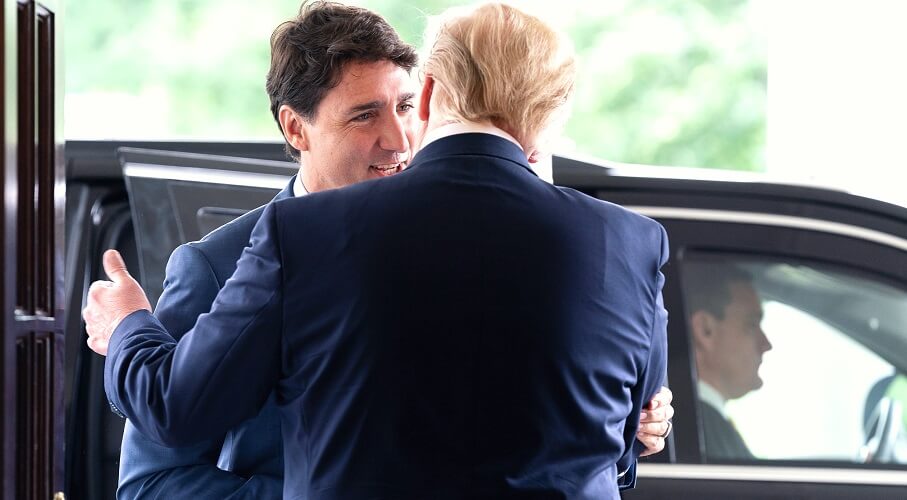This article originally appeared in the National Post.
By Balkan Devlen, February 20, 2024
As the Cold War was heating up in the late 1940s, U.S. Sen. Arthur Vandenberg said, “Politics stops at the water’s edge.” This sentiment is not shared by Prime Minister Justin Trudeau’s Liberals, it seems.
In their quest to find, or, sometimes, create out of thin air, wedges to stem their nosedive in the polls, the Liberals increasingly turn to foreign policy issues for electoral salvation. However, such instrumentalization of foreign policy undermines relationships with allies and, by extension, the Canadian national interest.
Government has the responsibility to keep partisan games out of foreign policy, yet the Trudeau Liberals have repeatedly failed in this regard. Two recent examples can be found in their handling of Ukraine and the United States.
First, the Liberals have used their update to the 2017 Canada-Ukraine free trade agreement as a political wedge. The revision was drafted with a provision that commits the parties to promote carbon pricing, which prompted Conservatives to vote against the bill that will incorporate the new deal into Canadian law. It still passed through the House of Commons, but the Liberals now claim that the Conservatives have abandoned Ukraine. Never mind that the original trade deal would have remained in force if the update failed to make it through Parliament, and that the new provision on carbon taxes does little more than virtue-signal.
The criticism that Conservatives are somehow anti-Ukraine because they oppose the wording of the trade deal also ignores repeated statements by party members who say otherwise. Several Conservative MPs — such as James Bezan, Michael Chong and Shuvaloy Majumdar — have expressed clear support for Ukraine since Russia’s full-scale invasion in February 2022.
One can criticize them for staying on message — “axe the tax” — even when it is not particularly relevant; however, claiming that Conservatives are anti-Ukraine is patently wrong. It is ironic, though, that these accusations are being levelled by the same government that sent our European allies back empty-handed when they came pleading for more Canadian natural gas to curb their reliance on Russian energy.
It is this government that still has not delivered an air defence system it promised to send Ukraine in January 2023 — one that is desperately needed to protect the country against Russian attacks.
As ammunition shortages become increasingly chronic for the Ukrainian military, this government still has not put out additional contracts to boost our dangerously low domestic supply, and instead pretends it is business as usual in peacetime. Meanwhile, the Liberals have announced $1 billion in cuts to the defence budget.
So, instead of focusing on supporting the defence of our allies against Russian aggression, the Liberals are manufacturing a wedge where there was none by coding support for Ukraine in partisan terms.
Unfortunately, the Liberals’ tactic seems to be bearing some fruit, as a recent public opinion poll by Angus Reid found increasing skepticism among likely Conservative party voters for continuing to support Ukraine. This is a clear example of how partisan wedge politics can undermine a broad national consensus on foreign policy.
Aside from politicizing Ukraine, the Liberals are taking clear partisan positions on American domestic politics as a primary electoral strategy. Republican front-runner Donald Trump is portrayed as the devil incarnate to drum up support (or scare the Canadian public), while Conservative Leader Pierre Poilievre is painted as Trump in the North and Tories as MAGA-lite who would bring “American-style politics” to Canada.
Putting aside another irony that it’s Liberal partisans who seem to enjoy roleplaying as Americans by importing grievances and culture wars to Canada, such an electoral strategy also undermines Canada’s relations with the U.S.
It doesn’t mean a second Trump presidency wouldn’t be a serious challenge for Canada, as was foreshadowed in his recent statement that he would not defend “delinquent” NATO members in the face of an attack, or that most Canadians don’t have negative views of Trump. It does mean that as the most important foreign relation we have, the Canada-U.S. relationship cannot and should not be a topic for partisan games.
Canada needs excellent relations with the U.S., regardless of who is in the White House. Portraying one candidate as a supervillain and using him as a foil to rescue your plunging numbers in the polls is a sure way to undermine and damage that relationship, should that candidate win.
Pursuing the national interest should be the guiding principle of foreign policy for any Canadian government. Manufacturing wedges on foreign policy where none exists or risking our most important foreign relationship in the hopes it will help you win the next election is not the way.
The Trudeau government should focus less on wedge-ology and more on governing in an increasingly dangerous world.
Balkan Devlen is a senior fellow and the director of the Transatlantic Program at the Macdonald-Laurier Institute.






